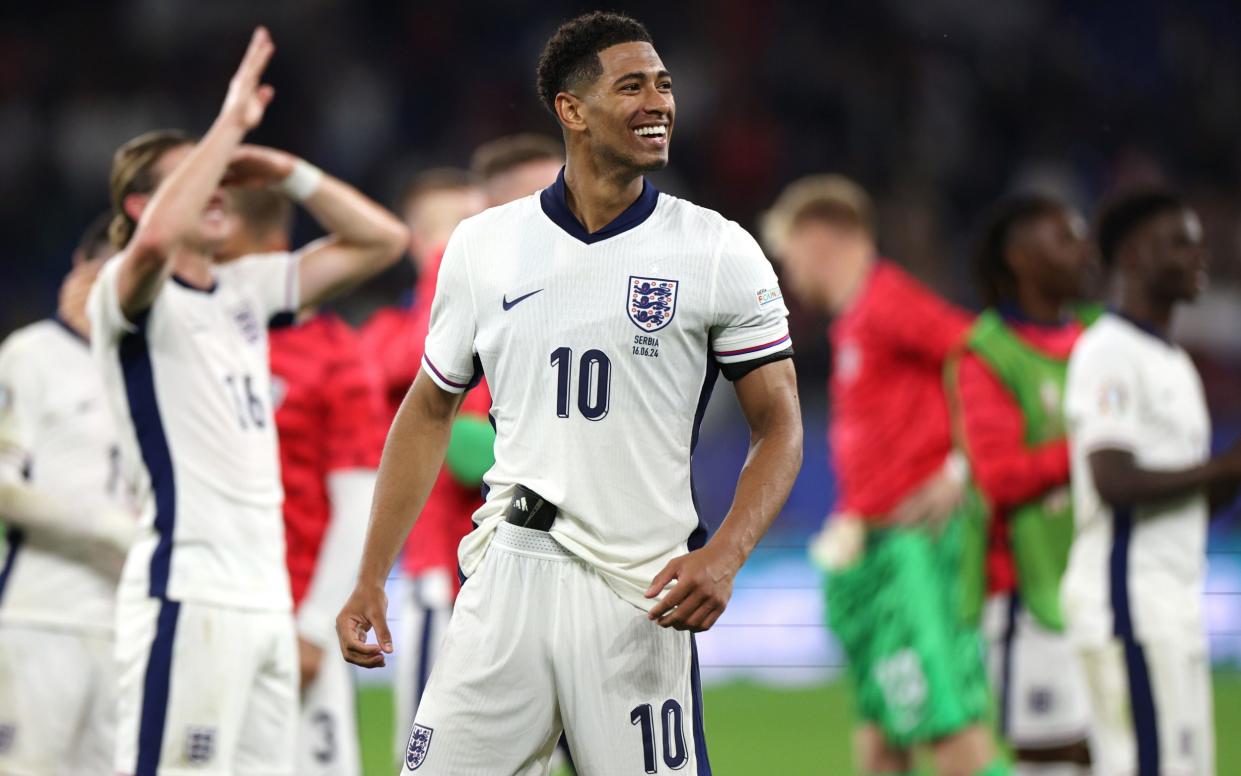I dislike football – but the Euros have taught me 12 vital lessons

- Oops!Something went wrong.Please try again later.
I have absolutely zero interest in football. But when the Euros come along, or a World Cup, then I participate. Not so feverishly as to watch other countries playing one another, but simply to cheer on England. And to shout “Come on England” and rather enjoy it because, in these febrile times, even thinking that between international soccer tournaments sounds sort of racist.
The rest of the time, I find football ghastly.
All these yobs marauding through train stations dressed in frightfully common and tight football shirts, chanting away, and then screaming at the top of their voices in stadiums and being horribly rude about the opposition. And all the players with their vanity and massive salaries, their fat-lipped girlfriends with their influencer side-shows. And all that utter garbage I have to listen to at 30 minutes past the hour on the Today programme, when grown men and women discuss the tactics of kicking a ball up and down a pitch and trying to pop it into the goal, as if it were a deeply complex military assault. And so while they want to ban (trail) hunting, I want to ban football.
But right now, I’ve jumped off my horse of pomposity and ignorance and joined them, and am, momentarily, blinded by the beauty, the fabulousness, the wit and comedy of football.
Suddenly, I am a man of the people. After a match, I can stand in a pub, or with a stranger on the train, and talk utter guff about the game. This nonsense is more rewarding than the weather, because, for these moments, we are united in common cause – of our ability to spout pure nonsense (“yeah, we (and what glee to say ‘we’, feigning some sort of transcendental, spiritual link with this garbage) seemed to lack focus in the second half”) and our common hope of winning (a match at least).
And then there are these learnings:
1. In (men’s) football, it is entirely acceptable for male TV pundits to talk drivel – but completely unacceptable for women to do the same.
2. Jude Bellingham can’t just score goals, he can give interviews in Spanish. Which makes him the most heroic role-model for a generation of kids who think foreign languages are pointless and teachers across the country will be savouring as priceless propaganda for their cause. He learnt the language as a respectful and intelligent adjunct to his time spent playing for Real Madrid and it also shows Bellingham’s commercial nous as he can now address the 475 million Spanish speakers across the world.
3. Gary Lineker has a mesmeric hold over his bosses. An easy-to-watch, relaxed and charming presenter, the Hyde to his respectable Jekyll, sees him sparking outrage with his views on everything from Palestine to refugees and advertising his clothing lines on prime time BBC without so much as a glimmer of admonishment from his bosses.
4. Footballers are so fit that when they are knocked down, screaming in agony, their face to the turf, seemingly dead, surely about to have a screen erected around them before they are gently carted off like some valiant and brave, yet defeated, gladiator, they suddenly jump up and immediately get on with the game as if nothing happened.
5. The word Hublot, on the substitution board held up to alert a player to leave the field, is the name of the sponsor not the oncoming player.
6. Only the players change ends after half time, supporters remain in their seats.
7. The offside rule is not a rule, it’s a belief system as complex as Jainism.
8. The Euros reveal that British and European economies are thriving and there is no such thing as a cost-of-living crisis. How else would hundreds of thousands of working and middle class football supporters be able to take a four-week holiday across Germany, funding flights, accommodation, food and drink and the cost of match tickets?
9. There is no point in staging the Euros in different countries every four years. It bankrupts the host nation and the only thing we learn about that nation’s culture are the names of the towns that host matches and, as Germany’s towns and cities are unpronounceable – (you try saying: “Where’s the Arena AufSchalke in Gelsenkirchen?”, pre-match after 18 pints), we won’t remember them anyway.
10. Goalkeepers, whose job is to keep balls from going in the goal, seem to get furious when they get their hands on a ball. So if they make a save, or pick up the ball in their box, their first reaction is not to look pleased with themselves for successfully carrying out their employment; they yell in rage to and swear at their fellow team members. Which is like a postman, for example, turning up at your door and throwing the mail at you.
11. Footballers (well some – OK, only Kyle Walker) change boots according to the pitch conditions as racing cars have their tyres changed at the track.
12. And England have a mystic ability to go from being deft and gifted footballing geniuses to defensive, lethargic and despondent donkeys within seconds.


